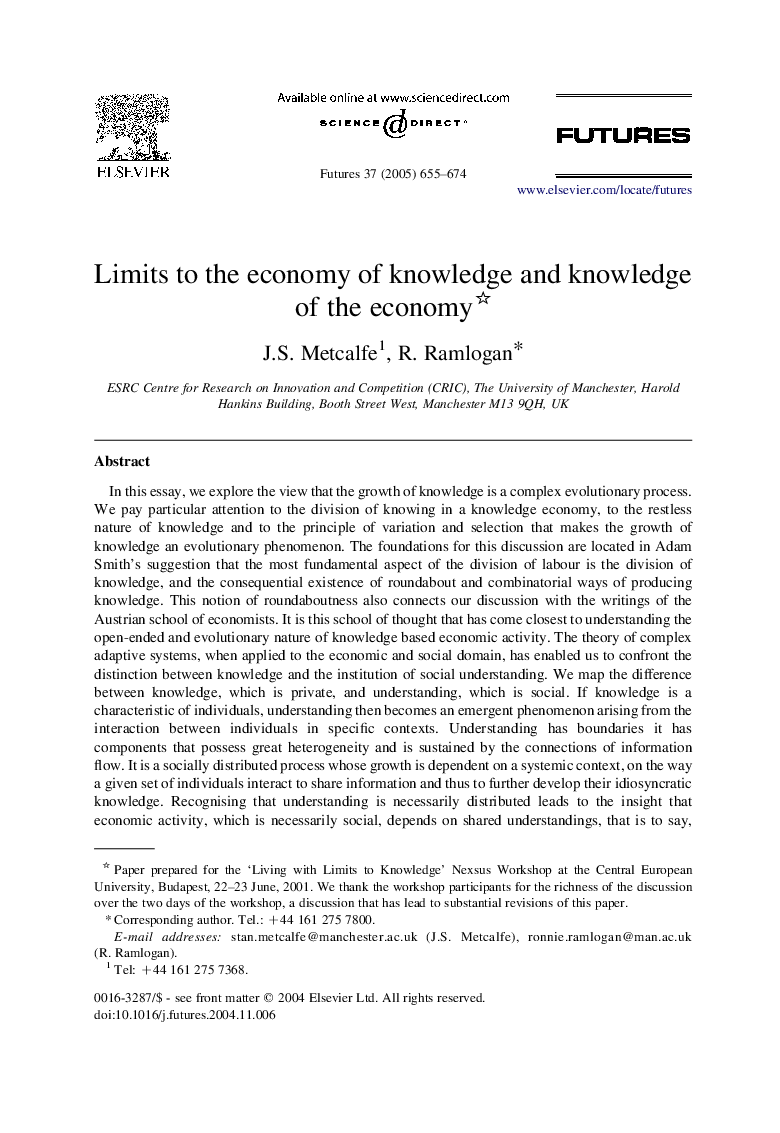| کد مقاله | کد نشریه | سال انتشار | مقاله انگلیسی | نسخه تمام متن |
|---|---|---|---|---|
| 10492134 | 939957 | 2005 | 20 صفحه PDF | دانلود رایگان |
عنوان انگلیسی مقاله ISI
Limits to the economy of knowledge and knowledge of the economy
دانلود مقاله + سفارش ترجمه
دانلود مقاله ISI انگلیسی
رایگان برای ایرانیان
موضوعات مرتبط
علوم انسانی و اجتماعی
مدیریت، کسب و کار و حسابداری
کسب و کار و مدیریت بین المللی
پیش نمایش صفحه اول مقاله

چکیده انگلیسی
In this essay, we explore the view that the growth of knowledge is a complex evolutionary process. We pay particular attention to the division of knowing in a knowledge economy, to the restless nature of knowledge and to the principle of variation and selection that makes the growth of knowledge an evolutionary phenomenon. The foundations for this discussion are located in Adam Smith's suggestion that the most fundamental aspect of the division of labour is the division of knowledge, and the consequential existence of roundabout and combinatorial ways of producing knowledge. This notion of roundaboutness also connects our discussion with the writings of the Austrian school of economists. It is this school of thought that has come closest to understanding the open-ended and evolutionary nature of knowledge based economic activity. The theory of complex adaptive systems, when applied to the economic and social domain, has enabled us to confront the distinction between knowledge and the institution of social understanding. We map the difference between knowledge, which is private, and understanding, which is social. If knowledge is a characteristic of individuals, understanding then becomes an emergent phenomenon arising from the interaction between individuals in specific contexts. Understanding has boundaries it has components that possess great heterogeneity and is sustained by the connections of information flow. It is a socially distributed process whose growth is dependent on a systemic context, on the way a given set of individuals interact to share information and thus to further develop their idiosyncratic knowledge. Recognising that understanding is necessarily distributed leads to the insight that economic activity, which is necessarily social, depends on shared understandings, that is to say, correlated knowledge. This provides a clue as to the unpredictability and unevenness of knowledge accumulation, and of course the unpredictability of capitalism as a knowledge driven system.
ناشر
Database: Elsevier - ScienceDirect (ساینس دایرکت)
Journal: Futures - Volume 37, Issue 7, September 2005, Pages 655-674
Journal: Futures - Volume 37, Issue 7, September 2005, Pages 655-674
نویسندگان
J.S. Metcalfe, R. Ramlogan,